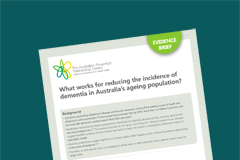What works for reducing the incidence of dementia in Australia’s ageing population?
This review aimed to identify interventions that may be effective in preventing, or delaying the onset, of Alzheimer’s disease and vascular dementia, and research gaps to inform future research investment.
Background
- Dementia is one of the leading causes of death and disability in older Australians. By 2050, more than 1.1 million Australians will be living with dementia, costing around $6.6 billion per year.
- Modifiable risk/protective factors proposed for dementia include diet, physical activity, smoking, alcohol and educational attainment overlap with those for lifestyle-related chronic diseases suggesting benefits to taking a multi-disease approach to these risk factors.
- Significant cost and quality of life impacts can be achieved by even modest delays in the onset of dementia so a more specific focus on strategies to delay the onset of dementia may have a greater impact over the longer term.
Key findings
- There were insufficient follow-up periods in studies to determine the impact of interventions on the incidence of dementia so impact on cognitive function was used as a proxy outcome measure.
- Cognitive training and physical activity (regular endurance training and tai chi) interventions produced medium to large effects.
- Separate systematic reviews of trials of omega 3 supplements and anti-hypertensive medication demonstrated small but significant effect sizes.
- Small effect sizes were found in trials of NSAIDs, cognitive training, improved diabetes control, and dietary supplementation with folic acid and vitamin B12 but the impacts of these interventions are likely to be further diminished outside of controlled study environments.
